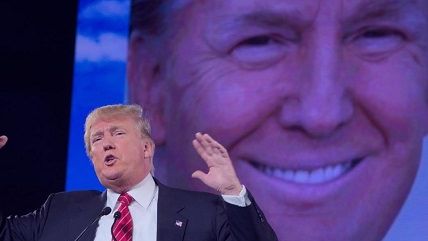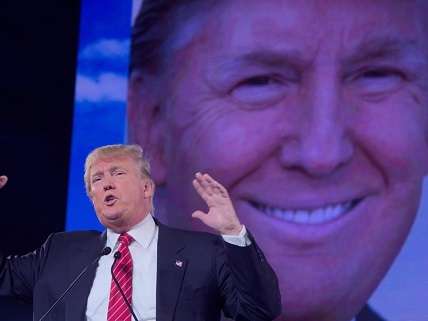Candidates AWOL on Plans to Cut Spending
Lowering taxes is only the first step, Mr. Trump.


Donald Trump is the most recent Republican presidential candidate to release a plan to reform our burdensome tax code. Though all the proposals are different, they share common characteristics. They would cut income tax rates on households, lower the tax code's bias against savings and investment, close some loopholes, and reform America's anti-competitive corporate income tax system. Now all they need to be politically credible are sister plans to produce concomitant levels of spending restraint.
According to the Tax Foundation, none of these plans would be revenue-neutral. Contrary to what you hear, that's a good thing, because it means they would reduce the amount of money the government collects from us. Using a static model that assumes people do not change their behavior much, over 10 years government revenues would shrink by $2.97 trillion under Rand Paul's plan, by $4 trillion under Marco Rubio and Mike Lee's plan, by $3.6 trillion under Jeb Bush's plan, and by $11.98 trillion under Trump's plan.
In contrast to the figures produced with a static model, a dynamic scoring of the plans reveals that Paul's plan would most likely cut taxes by $960 billion, Bush's by $1.6 trillion, Rubio-Lee's by $1.7 trillion and Trump's by $10.14 trillion.
Starving the government beast may sound great, but enacting a very large tax cut in a fiscal environment of large deficits would be politically problematic. According to the Congressional Budget Office's most realistic scenario, under the current tax-and-spending plan, spending as a share of the economy would jump from 20.5 percent this year to a whopping 30.4 percent in 2040. Revenue as a share of the gross domestic product would slightly increase, from 17.7 percent today to 18.1 percent in 2040. The gap between revenues and spending is worsening, and it would be even larger with the candidates' tax plans.
Moreover, the true size of government is measured by how much it spends, not by how much it collects. Hence, to truly starve the beast, the only sensible approach—both politically and economically—is to also propose serious spending restraint. To be sure, Sens. Rubio and Paul, as well as Bush, are on the record saying they favor spending cuts and genuine entitlement reform. Also, according to estimates, each of their tax bills would boost growth and produce some degree of revenue feedback (at least in the future).
However, if history is our guide, these candidates are not representative of the Republican Party as a whole. Cutting taxes is great, but as I said, it must be done alongside genuine spending restraint—meaning serious changes to Medicare, Medicaid, Social Security, and Affordable Care Act subsidies, which are consuming an ever-growing share of the budget. Doing one without the other would just kick the can farther down the road, an exercise that politicians are very good at.
The good news for the candidates is that a plan to cut spending isn't that hard—on paper, at least. The Cato Institute's Dan Mitchell calculated that we could balance the budget by 2021 by capping spending growth at 2 percent annually. Allowing spending to grow by 3 percent annually would balance the budget by 2024.
Now, those numbers are based on current tax policy. If lawmakers want big tax cuts, there will need to be commensurately greater levels of spending restraint.
The difficulty, of course, is to persuade politicians to implement such spending constraints and actually stick to them in the long run. That's made harder by the fact that the only realistic way to limit spending growth to 2 or 3 percent per year is to reform the fastest-growing programs in our budget, or the so-called entitlements. That would require standing up against the politically powerful special interests that benefit from these programs.
Candidates looking for reasons to take that courageous step may find comfort in the fact that we have no choice. By introducing plans now, candidates would show how serious they are about controlling deficits and the driver of our future debt—and they would make their tax plans much more politically credible.
COPYRIGHT 2015 CREATORS.COM


Show Comments (49)